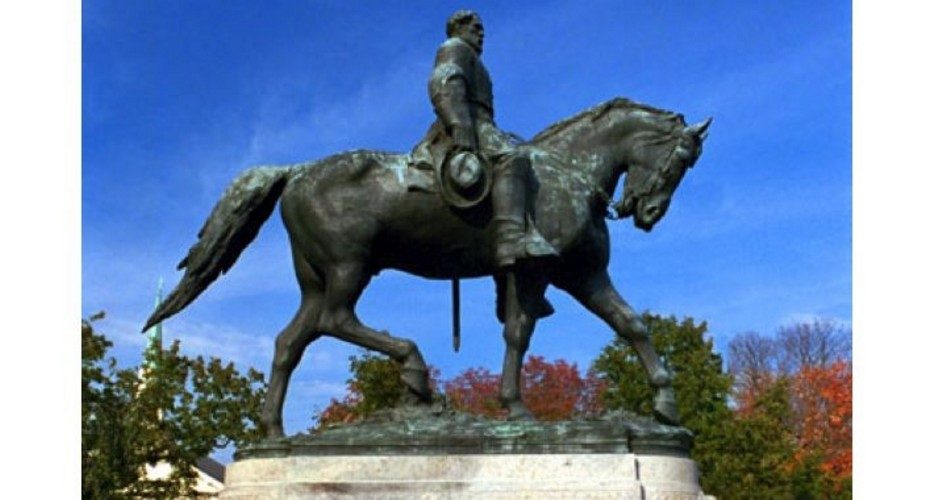
When the Charlottesville, Virginia City Council voted 3-2 last month to remove the statue of Confederate General Robert E. Lee (shown) from downtown Lee Park, they said they expected litigation to challenge their action. That expectation has been met, with multiple parties joining in a civil action to stop the planned removal of the monument.
Among those filing suits is the Monuments Fund, a nonprofit corporation. In the filed legal papers, the group stated that they wish to “stop the city from removing the Robert E. Lee monument from Lee Park and from radically reconfiguring both the Lee and [Stonewall] Jackson parks.” In a separate resolution, the Charlottesville City Council voted to rename Jackson Park. In its place, they proposed a new memorial be built to honor those who were legally enslaved in the city.
Joining in the lawsuit are the Virginia Division of the Sons of Confederate Veterans (SCV), comprised of male descendants of men who served in some capacity in the Confederate Army during the Civil War; Betty Jane Franklin Phillips, a “collateral descendant” of Paul Goodloe McIntire (the man who granted the parks and the memorials to the city); several military veterans; and others.
The Friends of C’Ville Monuments argue that removal of the Lee and Jackson statues is an attempt to erase history and an insult to those who wish to honor their Confederate ancestors, and all war veterans. In their lawsuit, the plaintiffs contend that the city is in the wrong legally on two counts. First, it violated a state law that protects war memorials. Second, when Paul Goodloe McIntire gave the city the parks and the memorials, the deed stipulated that the memorials would not be removed, and the park would not be re-named from Lee Park.
Defending the city’s actions in the lawsuit will add to the cost of any removal, which had already been estimated to be about $300,000.
The direct attacks upon the monuments began last year when Wes Bellamy, one of the council members who voted to banish the monuments, joined in a rally that called for the removals. Charlottesville High School student Zyahna Bryant had circulated a petition demanding the Lee statue be removed from the park. Bellamy joined Bryant in claiming the statue represented a legacy of racial oppression.
City Attorney Craig Brown defended the legality of the council’s action. “I unequivocally am not objecting to council’s decision to move the Lee statue on legal grounds.”
Bellamy, Bob Fenwick, and Kristin Szakos were the three council members who voted to remove the General Lee monument. Along with Mayor Mike Signer and council member Kathy Galvin, neither of whom voted to remove the statue, they are being sued for $500 in actual damages and $100,000 each in punitive damages. The plaintiffs argue that the city simply ignored both state law and the terms of the deed in making their controversial decision.
According to the plaintiffs’ briefs, the monuments and memorials from the War Between the States are protected by law in Virginia, which makes it illegal to disturb them.
Charles Weber, one of the plaintiffs in the case, argued that the issue in this case is actually a legal question. “The lawsuit is not about resolving the political question; we’re not going to court to answer that question,” Weber explained. “We all have to have that confidence that our elected officials are going to take due account to do what the law says. I think the lawsuit benefits both parties in the long run because it will vindicate the rule of law. Once it’s vindicated, we can have a conversation about what monuments the city needs to tell its full story.”
“There’s a monument protection law that says they can’t do what they did,” Weber said.
But those who want the monuments removed have argued that they contradict the values of multiculturalism. The contradiction, though, is better illustrated in the effort to remove the monuments. If one is truly concerned about valuing all cultures, what about the millions of Americans who are descendants of at least one Confederate veteran?
At one time, Robert E. Lee was revered by Americans North and South as not only a brilliant general, but a man of exceptionally noble character. In his second Inaugural Address, President Abraham Lincoln advocated an effort to “bind up the nation’s wounds.” Part of that effort was to recognize southern heroes such as Lee and Thomas “Stonewall” Jackson alongside northern icons such as Lincoln and Ulysses S. Grant.
The Taliban-like attacks upon Lee and Jackson are not only mean-spirited, but they are also based on a misconception of the motivations of the two men in fighting the war. To illustrate this point, I recall my recent trip to New Orleans, a city that is in the process of removing its own Lee monument. During our vacation in the Big Easy, my wife and I took a tour on a double-decker bus. The tour guide noted the Lee monument during our ride, remarking that we had better take a good look at it, because it would soon be removed. He then delivered a one-minute rant about the supposed evils of Lee, charging that he was a “slave-owning dude,” who had “never done anything for the city of New Orleans.”
The most charitable thing I could say about his comments is that they were rooted in ignorance. While Lee had at one time owned slaves, he had freed them before the first battles of the war. The same could be said about the father of our country — George Washington, because though he too once owned slaves, he eventually freed them. Still, Washington had owned slaves — making him just another “slave-owning dude.” Under the tour guide’s reasoning, should we knock down the Washington Monument in Washington, D.C.? And while we’re at it, should we re-name the nation’s capital city? Perhaps the 7,000 streets in America named for Washington should also be rechristened with a name more suited for modern political correctness.
There are efforts to take down Andrew Jackson’s statue in Jackson Square in New Orleans, as well. Of course, residents there should recall that without Jackson’s victory at the Battle of New Orleans in 1815, the city might well have become a British possession.
Lee not only opposed slavery, but he also opposed the secession of Virginia. For those who think the war was fought to end slavery in the South, they should note that President Lincoln called for 75,000 volunteers not to end slavery, but rather to save the Union. At the time of this call, Virginia was still part of the federal Union, having rejected secession as did a majority of the states where slavery was still legal in 1861. Lincoln’s decision to use military force upon the seven states that had seceded precipitated four more states — including Virginia — to likewise exit the Union. For them, the issue was not slavery, but opposition to Lincoln’s de facto declaration of war upon some sister states.
At this point, Lee had to choose. He could have taken command of all U.S. military forces as was offered to him, or he could opt to stay with his native Virginia. He lamented that he simply could not unleash his sword against his homeland of Virginia. To Lee, the issue of the war was not to keep his slaves (he had none) but rather to repel an invading force.
Regardless of whether one agrees with Lee’s ultimate decision, binding up the nation’s wounds after a war that took at least 600,000 lives involved honoring all the dead in that conflict, and the heroic figures of the contest. And there was no more heroic figure to emerge from that awful conflict than Robert Edward Lee.
To others, however, such as my New Orleans bus guide and the council members in Charlottesville, what matters most to them is insulting the memory of heroic figures such as Lee and Jackson. And those who think that it will stop at Confederate symbols should note the recent attacks upon the American flag. After all, even Old Glory itself offends some individuals.
Of course, offending the descendants of Confederate soldiers by tearing down monuments to such men as Lee and Jackson is an acceptable type of “offending.”


